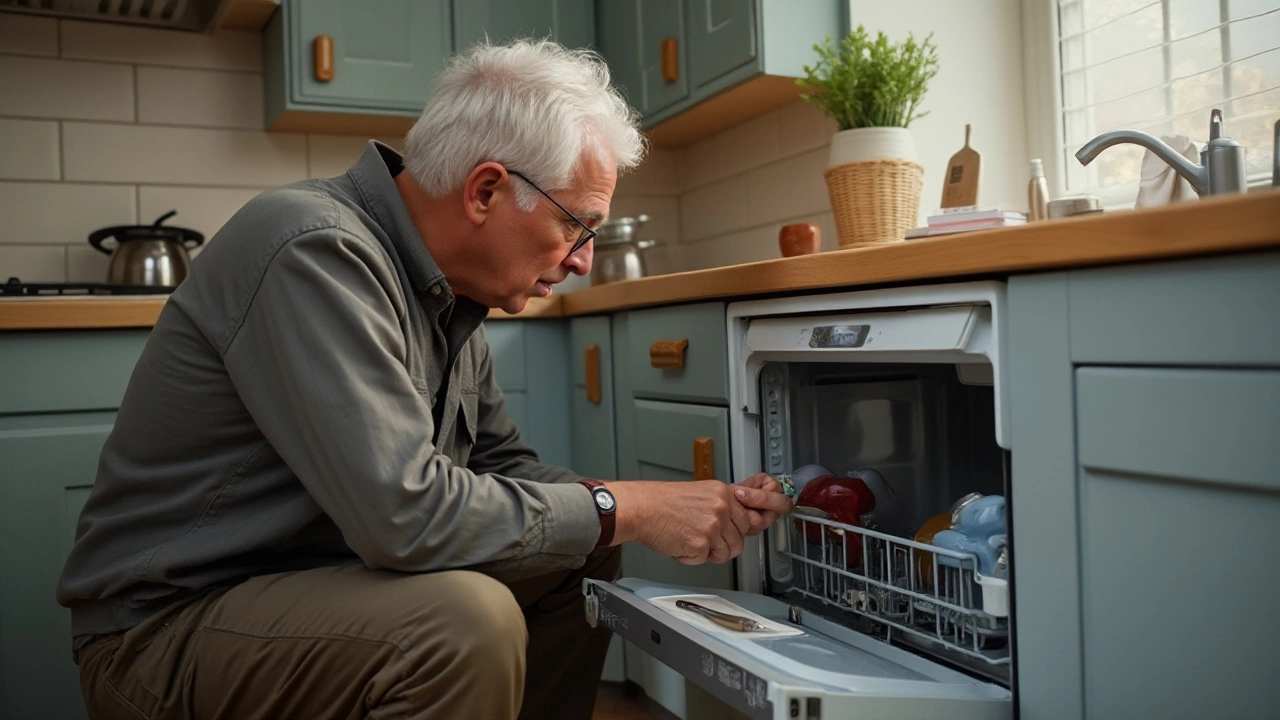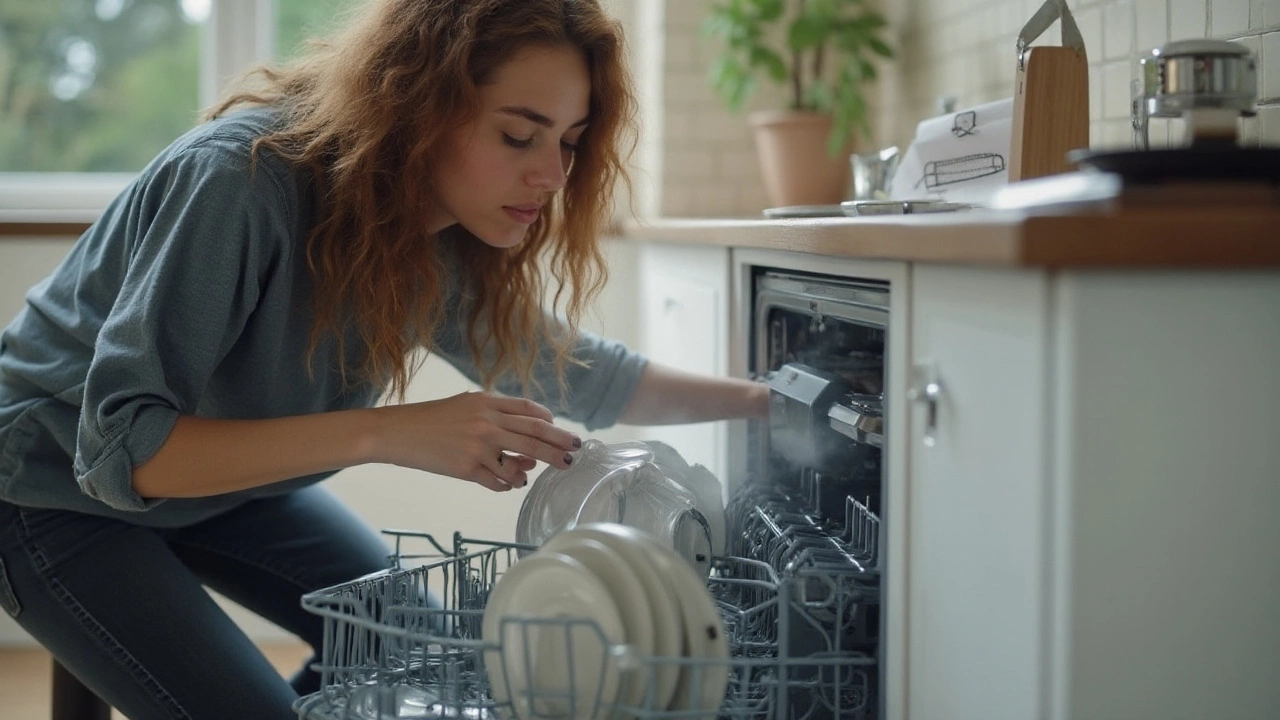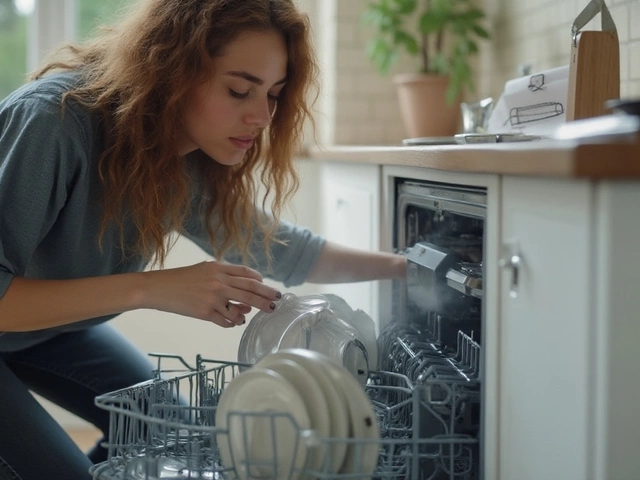Our trusty dishwashers often become the unsung heroes in our kitchens, bearing the brunt of daily clean-ups with minimal fuss. But like all things mechanical, even the best of them can stutter and stall over time. So, how do you know when your dishwasher has simply hit a bump in the road or when it's waving the white flag?
In this guide, we’ll walk through how you can spot tell-tale signs of trouble, from unexplained leaks to stubbornly dirty dishes, and help you decide when it's worth calling in a repair professional or when it's time to consider a newer model. After all, knowing what to watch out for can save you from kitchen chaos and maybe even a few extra bucks. Let's dive in and explore what keeps your dishwasher running smoothly and when it's time to say goodbye.
- Recognizing Common Dishwasher Issues
- Evaluating Dishwasher Efficiency
- Deciding Between Repair or Replacement
- Tips for Dishwasher Maintenance
Recognizing Common Dishwasher Issues
The first step in maintaining a healthy dishwasher is understanding the signs that indicate something might be amiss. Let's paint a picture, shall we? You’ve just had a wonderful dinner party, the perfect capstone to an otherwise monotonous week. As the guests leave and the evening settles, you load up the myriad of dishes, press the familiar button, and rest easy knowing your trusty dishwasher is there to handle the rest. But the next morning, you find a puddle on the kitchen floor, a not-so-subtle hint that all might not be well with your kitchen partner. Puddles, spills, and leaks are one of the most noticeable problems, often caused by faulty door seals or a clogged drain that never seems to unclog itself.
Noise can also be a harbinger of upcoming issues. While it’s true that every dishwasher sings its own tune, there comes a time when extra clanks and clunks venture into ‘what’s-that-sound’ territory. Such noises could be telling you about a deteriorating pump, the need for a filter cleaning, or something more ominous. If it seems too much like an impromptu percussion concert, it might be time to explore the source. A strong indicator that necessitates **dishwasher repair** involvement is when your dishes do not come out as squeaky clean as expected. Maybe there's a water supply issue, or perhaps it’s those old spray arms not spinning properly. Whatever the cause, dirty or cloudy dishes are trying to communicate a deeper problem.
Then there's the daunting task of identifying power or electrical faults. Imagine the horror of pressing that power button, only to be greeted by silence, or worse, a flickering light that screams ‘intermittent’. Power issues, often the most frustrating, can range from electrical surges shorting the circuitry to worn-out components needing replacements. Of course, when dealing with electricity, safety first! Do not try to second-guess these issues on your own without the proper expertise; it’s worth consulting with an electrical technician.
According to Consumer Reports, "consumers report [dishwashers] break down during or right after the warranty period," emphasizing the importance of not ignoring any unusual signs. If you're constantly wrangling with issues, it might be worth considering replacement over repair, especially if your appliance is nearing its warranty's sunset. This can save you the frustration and costs associated with frequent fixes. A pro tip from maintenance experts suggests that simple things like keeping the filter clean can prevent many common issues, yet it’s easy to overlook this little detail that can make a huge difference in your dishwasher’s lifespan.

Evaluating Dishwasher Efficiency
There’s more to dishwashers than just the clatter of cycles and the rush of water. Assessing the efficiency of your machine involves understanding how well it performs under different demands and recognizing signs of aging performance. A key indicator of efficiency is, of course, how clean your dishes emerge. If you find yourself re-washing items that should come out sparkling, it might be time to crunch some numbers. Appliance maintenance from regular cleaning of filters and spray arms to checking water hardness plays a huge role in ensuring performance. But even with meticulous care, things can start to slip. Engagement with energy usage reviews can also clue you into efficiency levels. Energy-efficient models not only keep your environmental footprint low but also promise long-term savings on your utility bills.
Constant breakdowns or the need for frequent repairs might hint that your dishwasher is doing more work than it should. Remember, those repair bills can start adding up, sometimes surprisingly matching the cost of a new machine. When evaluating whether to repair or replace, consider the age of the dishwasher. The general lifespan of most dishwashers is about 9 to 12 years. If yours is nearing the end of this range and doesn’t meet current energy efficiency standards, a replacement might be more economical.
According to Consumer Reports, "An Energy Star rated dishwasher can save an average household more than 1,600 gallons of water over its lifetime," which is a significant reduction.
Assessing Performance
Your appliance's performance can also be gauged through its cycle times. Older or underperforming models may run noticeably longer trying to reach the desired cleaning results, possibly due to clogged or faulty components. This inefficiency can translate to higher utility bills. A newer model can reduce time and energy outputs through technological advances like soil sensors, which adjust water usage and cycle times accordingly.
| Feature | Old Dishwasher | New Dishwasher |
|---|---|---|
| Energy Consumption | 1.8 kWh per load | 1.3 kWh per load |
| Water Usage | 10 gallons per load | 6 gallons per load |
Finally, take heed of any unusual noises. Grinding or squealing isn’t just an annoying soundtrack; they can signal mechanical failings. Such disturbances could be indicative of motors or pumps on the brink. Optimizing efficiency could simply be a matter of keeping up with routine upkeep, performing a thorough clean of the spin arms, trap, and seals, and ensuring there’s nothing obstructing water flow or spray.

Deciding Between Repair or Replacement
When your trusty dishwasher suddenly stops working, it's easy to feel overwhelmed by the prospect of fixing or replacing it. Yet, making this decision doesn't have to be daunting if you have a clear understanding of what to consider. First off, the age of your appliance plays a crucial role. Most dishwashers have an average lifespan of 8 to 10 years. If yours is close to or past this age, it might be more economical to invest in a new one rather than pouring money into repairs. Of course, this doesn't mean a younger dishwasher shouldn't be repaired, especially if it has been relatively trouble-free up until now.
Dig a little deeper by examining the nature of the problem. Is it something simple, like a clogged drain or some debris lodged in the spray arm, or is it a more complex issue, like a broken pump or a faulty motor? Simple issues can often be fixed at a lower cost. However, for major components that require replacement, the cost can quickly add up, sometimes nearing the price of a new dishwasher. Always weigh these estimated repair costs against the price of a new model. A newer dishwasher will likely have better energy efficiency, saving you money in the long run on both water and energy. This is where your knowledge of appliance maintenance comes into play, especially if you're inclined to handle minor repairs yourself.
It's also important to think about the frequency of repairs. If you're calling a repair technician every few months, it might be time to consider a dishwasher replacement. Repeated repairs can signal that your appliance is on its last legs, and continuous spending on repairs is seldom practical. As the well-known saying by researcher Perry L. Martin goes, "Sometimes, chasing the problem can cost more than solving it with a new solution." In other words, the money you spend chasing after your appliance's faults could be better invested in a replacement.
Don’t forget about the benefits of new technology. Modern dishwashers often come with enhanced features such as improved water usage, quieter operation, and even smart technology that allows you to start a cycle from your phone. These upgrades might provide more value than sticking with an older model. Conduct a bit of research into these modern conveniences and weigh them against the satisfaction you've received from your current dishwasher. The decision often falls into one of two categories: economic rationality and personal satisfaction.
Finally, consider the environmental aspect. Repairing an existing appliance keeps it out of the landfill a little longer, but if the efficiency of a new model is significantly better, the energy savings over time can actually offset the initial carbon footprint of manufacturing a new unit. The balance between sustainability and practicality is indeed a tightrope walk but one that can ultimately benefit both your wallet and the planet. By viewing the decision with an objective and informed mindset, you'll be more likely to take a path that suits you best.

Tips for Dishwasher Maintenance
Keeping your dishwasher running smoothly extends its lifespan and enhances its performance. A few easy steps can help you maintain your dishwasher to ensure it remains a reliable member of your kitchen team. First and foremost, regularly clean the filter. This often-overlooked part plays a crucial role in catching food particles and preventing clogs. Simply unscrew it from the base of the machine, rinse it thoroughly, and replace it. Make it a habit to check the filter at least once a month. This one step can save you from potential unpleasant blockages and even unpleasant odors. Another useful tip is the regular inspection and cleaning of the spray arms to ensure they are not clogged by grime build-up. Detach them carefully and rinse under warm water to clear any debris.
Not only is it essential to clean internal components, but ensuring the cleanliness of the external parts is also crucial. Wipe down the door gasket with a damp cloth to maintain its flexibility and ability to seal the dishwasher tightly during each cycle. The outer surface may also benefit from a gentle wipe down with a mild cleaner suitable for the material. Moreover, running an empty cycle with basic white vinegar can help decalcify and freshen the interior compartments, using vinegar's natural properties to dissolve lime and mineral deposits. It's a natural and cost-effective way to keep your dishwasher sparkling and efficient. For a sparkle boost, sprinkle a little baking soda across the bottom rack and run another short cycle. It'll help vanish any lingering odors, leaving the space fresh and ready for its next load.
Using Your Dishwasher Wisely
Disciplined loading is another practice that can prolong your appliance maintenance. Although it may seem tempting to jam-pack every inch of the dishwasher, overloading can impede the machine’s ability to function efficiently. Take care to evenly distribute items allowing the spray arms sufficient clearance. Ensure stained or soiled areas are positioned to face the water jets directly for the best outcomes. Consider running smaller loads if you find dishes aren't cleaning properly as it may prevent the build-up of soil particles and residue. An often-overlooked tip includes the proper use of detergent. Too much detergent doesn’t equate to cleaner dishes and might even damage your dishwasher over time. Opt for detergent formulated specifically for dishwashers and consider your area’s water hardness when determining the correct amount.
Occasionally, it's a novel idea to keep your dishwasher up to date with emerging eco-friendly technologies, as they progressively aim to conserve water and energy. According to new surveys and studies, newer dishwashers consume much less water compared to their earlier generations. Research conducted by the Appliance Management Institute showed a 30% reduction in water usage within modern units over the past decade. Taking a keen interest in such advancements may not only cut utility costs but could significantly shrink your household's environmental footprint.
"Using innovative technology in our daily appliances not only boosts efficiency but also nurtures a sustainable future," remarked Helen Bennett of Eco Trends Magazine. Consider these aspects when thinking about repairs or replacements, but routine maintenance will always form the bedrock of longevity for any appliance.




